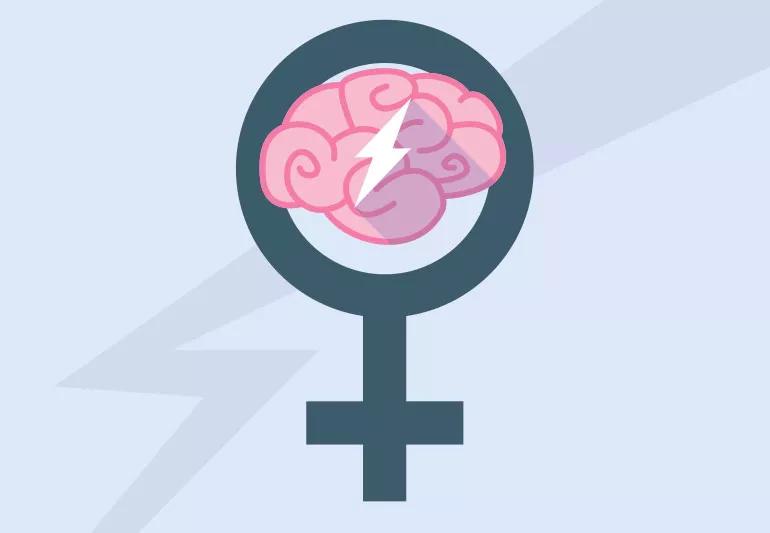Hormonal changes and pregnancy are some factors unique to women

When it comes to stroke, we all share the same major risk factors: smoking, high blood pressure and elevated cholesterol.
Advertisement
Cleveland Clinic is a non-profit academic medical center. Advertising on our site helps support our mission. We do not endorse non-Cleveland Clinic products or services. Policy
But stroke risk in women can also be influenced by factors not shared by men. This includes hormonal changes, pregnancy and the use of birth control pills.
These causes of stroke are why women have their own guidelines for stroke prevention tailored specifically for them. These guidelines provide a set of strategies to reduce your risk for stroke — the third-leading cause of death for women, according to the U.S. Centers for Disease Control and Prevention (CDC).
“It’s necessary to have guidelines specifically for women,” says neurologist Dolora Wisco, MD. “The major risk factors for men and women are very similar. But for women, you add another layer, and those are the more sex-specific risks.”
The special set of stroke risks that are unique in women led to the release of a specific set of guidelines by the American Heart Association and American Stroke Association in 2014.
These guidelines, built on research by a panel of experts and reviewed extensively by their peers, outlined those specific risks, hoping to fill a gap in healthcare and stroke prevention.
A few conditions for those who are pregnant can result in increased stroke risks. Some of the complications that can increase the risk of stroke and heart disease during pregnancy include:
Advertisement
Pregnancy-related hypertension is the condition most often tied to both hemorrhagic and ischemic stroke in women who are pregnant or who are postpartum. If you begin to experience headaches during your pregnancy, this can be the first sign of conditions like preeclampsia and other conditions that cause a narrowing of the blood vessels in your brain. Don’t ignore these headaches, advises Dr. Wisco, and let your healthcare provider know.
It’s also important to note that if you’ve experienced hypertension prior to pregnancy, you’re at greater risk for hypertension during pregnancy.
In the post-partum period shortly after giving birth, Dr. Wisco says that it’s also more common to see a range of other blood clot and vascular disorders that can lead to stroke, including cerebral venous thrombosis (a blood clot in one of your brain’s veins) and artery dissections (a tear in one of your arteries).
In fact, a recent study found that the highest risk period for stroke in relation to pregnancy is in the period leading up to and just after giving birth — from about one day before to two weeks after delivery. If you have one or more of the complications that could put you at greater risk for a stroke, Dr. Wisco recommends talking to your provider about prevention options, including low-dose aspirin and other prescription medications.
While birth control is very safe, there are certain conditions in which the hormones used in birth control pills may raise the risk of stroke. In particular, if you have high blood pressure, diabetes, obesity, currently smoke or have experienced central venous and sinus thrombosis, you should check with your healthcare provider before starting birth control.
The best way to minimize your risk for stroke is to manage the other risk factors, including not smoking and keeping your blood pressure at a healthy level. For people with diabetes, it’s also important to manage your condition as best you can and work with your healthcare provider to keep your blood sugar at healthy levels.
As you experience menopause, your body produces less estrogen, which can cause symptoms like hot flashes, trouble sleeping and vaginal dryness. Hormone therapy for menopause involves taking estrogen or progesterone to ease those symptoms. Some data suggest people who use this type of hormone therapy are at an increased risk of blood clots and stroke, but study results are conflicting. Guidelines released in Europe in 2022 recommend using hormone replacement therapy if it’s right for you, as avoiding its use won’t lower your risk for stroke.
Advertisement
Dr. Wisco recommends talking with your healthcare provider if you’re considering hormone replacement therapy but have any other risk factors for stroke, such as high blood pressure, heart disease or diabetes.
According to the CDC, women who are Black have an even higher risk of stroke and have the highest rate of death due to stroke. That’s because they are also at a higher risk for certain conditions that are associated with stroke. Among them are:
The CDC states that almost half of women who are Black in the U.S. have at least one risk factor for stroke.
The most common stroke symptoms are the same for everyone. Use the BE FAST acronym to remember these signs:
Also, a sudden onset of a severe headache without a cause is another symptom most common with intracranial hemorrhage.
But some women can experience other, more subtle early signs of stroke that may not be as readily recognized as a stroke, including:
Advertisement
Any sudden, unexplainable loss in function should prompt a call to a healthcare provider. If it’s a stroke, getting treatment immediately can make all the difference.
“I think the most important thing with these guidelines is to know your risk factors,” Dr. Wisco stresses. “If you have high blood pressure, diabetes, cholesterol or you’re smoking, those are major risk factors that you need to be paying attention to.”
According to Dr. Wisco, the good news is that some of these factors can be lowered by the right approach.
“If you have high blood pressure, see your doctor, have it checked out and see what you can do to lower your blood pressure via lifestyle changes and/or medication,” she advises.
“If you’re on oral contraceptive pills and you are smoking, quit smoking. That helps out not only for your cerebrovascular and cardiovascular health, but in a whole lot of things for your health in general.”
Advertisement
Learn more about our editorial process.
Advertisement

Seek immediate medical attention for sudden loss of balance, vision changes, slurring, facial droopiness and limb weakness

Strokes in the left side of the brain are more common and the effects are typically more noticeable

Your age, the type of stroke you had, the cause and the location can all impact your recovery

It can be overwhelming, but habit changes help lower your risk of another stroke

What you eat may protect you from a ‘brain attack’

Know the warning signs + decrease your risk

The short answer from a vascular neurologist

Watch for depression, behavior changes

The tropical fruit is a good source of antioxidants and vitamin C

Most people fall asleep within 10 to 20 minutes, but if your experience is different, adjusting your sleep schedule may help

Exploring your hidden side can lead to better understanding of what makes you tick